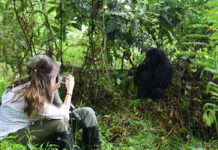East Africa is a region abundant in culture, history, and diversity, providing travelers with opportunities to engage in everything from lively urban experiences to untouched wildlife sanctuaries.
Whether you are navigating the vibrant streets of Nairobi, hiking through the fog-laden mountains of Rwanda, or embarking on a safari in Tanzania, familiarizing yourself with local customs and etiquette is essential for ensuring a respectful and enjoyable journey.
Each nation within East Africa—Kenya, Uganda, Tanzania, Rwanda, and Burundi—boasts its own unique traditions; however, there are several general travel practices that are crucial to understand when visiting the area. Being aware of these customs can enrich your East Africa safari experience, enhance your appreciation of local cultures, and facilitate meaningful connections with the individuals you encounter during your travels.
Greeting and Communication
In East Africa, greetings hold great importance in everyday interactions. It is customary to extend polite greetings before initiating any conversation, particularly when meeting someone for the first time. The handshake is the predominant method of greeting, often accompanied by a warm exchange of pleasantries.
In Kenya and Uganda, handshakes are typically firm, and it is common to inquire about one’s well-being, with responses such as “I’m fine, thank you.” In Tanzania, you might experience a unique greeting known as “the Tanzanian handshake,” where one individual grips the other’s hand, shakes it once, and then places their hand over their heart, signifying sincerity and respect.
Conversely, in Rwanda, greetings tend to be more formal, especially in rural regions. Initiating a conversation with “Muraho” (hello) or “Bite” (how are you?) is a respectful approach. It is important to note that locals may anticipate inquiries about their health or family before delving into business discussions or other subjects.
Dress Code
The dress code across East Africa differs from one country to another, but a general emphasis on modesty is prevalent. While some tourist destinations may have a more relaxed approach, it is advisable to maintain a conservative style, particularly in rural or religious contexts.
In Kenya and Tanzania, the local population typically adheres to modest attire, especially in smaller towns and villages. When visiting religious sites such as churches and mosques, it is essential to cover both shoulders and knees. Women are particularly encouraged to wear long skirts or dresses, while men should refrain from wearing shorts in more formal or traditional environments.
In Uganda, modest clothing is highly regarded, particularly in rural regions. Although casual wear is acceptable in tourist areas, visitors should steer clear of overly revealing outfits. When engaging with local communities or attending religious services, it is advisable to cover shoulders and avoid short skirts or shorts.
In Rwanda, the dress code leans towards the formal, with an emphasis on long pants and modest attire. When visiting places of worship or government offices, dressing appropriately is crucial to demonstrate respect.
Respecting Traditions and Religion
East Africa is characterized by a diverse array of religious and cultural communities, making it crucial to demonstrate respect for their beliefs to facilitate harmonious interactions. In Kenya, Uganda, and Rwanda, Christianity is the leading religion, whereas Islam is prevalent in certain regions of Kenya and Tanzania, particularly along the coastal areas and in Zanzibar.
Visiting Religious Sites: When attending churches, mosques, or temples, it is important to take off your shoes prior to entering, particularly in mosques and certain churches. Additionally, modest attire is essential, especially for women, who may want to wear a scarf or head covering when entering these places of worship.
Public Behaviour: Expressions of affection in public, including actions like kissing or hugging, are typically discouraged in East Africa, especially in rural regions and among conservative groups. It is advisable to refrain from such behaviours in public spaces.
Respect for Elders: In East African societies, elders are held in high regard. It is customary to stand and speak with respect when greeting an elder. A handshake should be offered with the right hand, as the left hand is often viewed as less clean in numerous East African traditions.
Tipping Etiquette
Tipping is a prevalent custom in East Africa, particularly within the service sector. In dining establishments, it is standard to leave a gratuity of approximately 10% of the total bill when service charges are not already included. Additionally, hotel personnel, tour guides, and drivers often welcome small tips for their assistance.
In Tanzania, it is typical to provide porters, drivers, and guides with a few dollars each day as a token of appreciation. The tipping practices in Uganda and Kenya are quite similar, where modest amounts are valued for exemplary service.
It is essential to understand that while tipping is not mandatory, it serves as an excellent means of expressing gratitude for quality service.
Photography and Privacy
In East Africa, photography is typically permitted in most tourist destinations; however, it is crucial to seek permission before capturing images of individuals, particularly in rural regions. Many residents, especially in Uganda and Kenya, may be uneasy about being photographed without their consent. Requesting permission, particularly in villages or when photographing children, demonstrates respect for local traditions and privacy.
Additionally, in certain locations, especially near religious sites or during cultural events, photography may be limited. Therefore, it is advisable to inquire whether taking pictures is permitted.
Bargaining and Market Etiquette
Negotiation is a prevalent activity in numerous East African markets, especially in Kenya, Uganda, and Tanzania. When visiting local markets, feel free to discuss prices, as vendors typically anticipate this practice. However, it is essential to engage in bargaining with politeness and respect.
In various cultures, bargaining is regarded as a form of social engagement rather than a conflict, making it crucial to maintain a friendly demeanor. Keep in mind that while you are seeking a more favorable price, the seller is also striving to earn a livelihood, so it is vital to present reasonable offers.
Personal Space and Social Interactions
In East Africa, particularly within rural communities, the concept of personal space may differ from what you are accustomed to. Individuals often stand in close proximity while conversing, and it is customary for strangers to exchange greetings, even without prior acquaintance.
In countries like Tanzania and Kenya, it is common to observe people having extended discussions in public spaces or sharing meals with their neighbors. As a visitor, embracing these social interactions can enrich your experience and foster connections with the local population.
Conversely, in urban settings, individuals may exhibit more reserved behavior, making it important to remain aware of your environment and to respect personal space.
Conclusion
Gaining an understanding of and showing respect for the travel customs in East Africa can greatly enrich your journey. Whether you are visiting the culturally vibrant cities of Nairobi or Kigali, or embarking on a wildlife adventure in Serengeti or Queen Elizabeth National Park, being aware of local customs will enable you to forge unforgettable memories while honoring the diverse cultures you encounter.
The hospitable nature of East Africa’s inhabitants, along with its lively traditions and profound heritage, makes it an exceptional destination. By adhering to straightforward guidelines regarding greetings, appropriate attire, religious customs, and social interactions, you will not only cultivate a greater appreciation for the region but also ensure that your travels are respectful, seamless, and enjoyable.
Therefore, when planning your next trip to East Africa, keep in mind that the experience extends beyond the attractions you visit; it also encompasses the individuals you meet and the culture you engage with.












